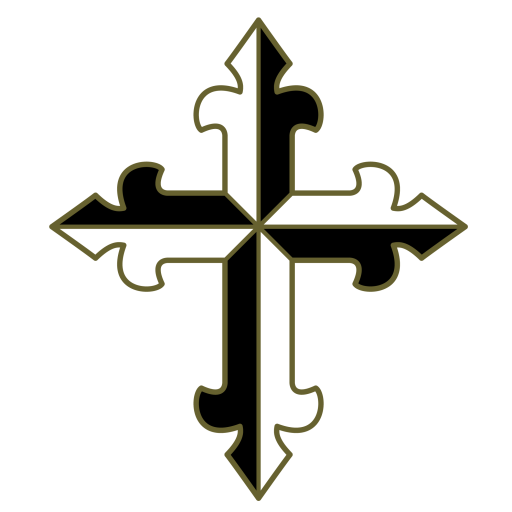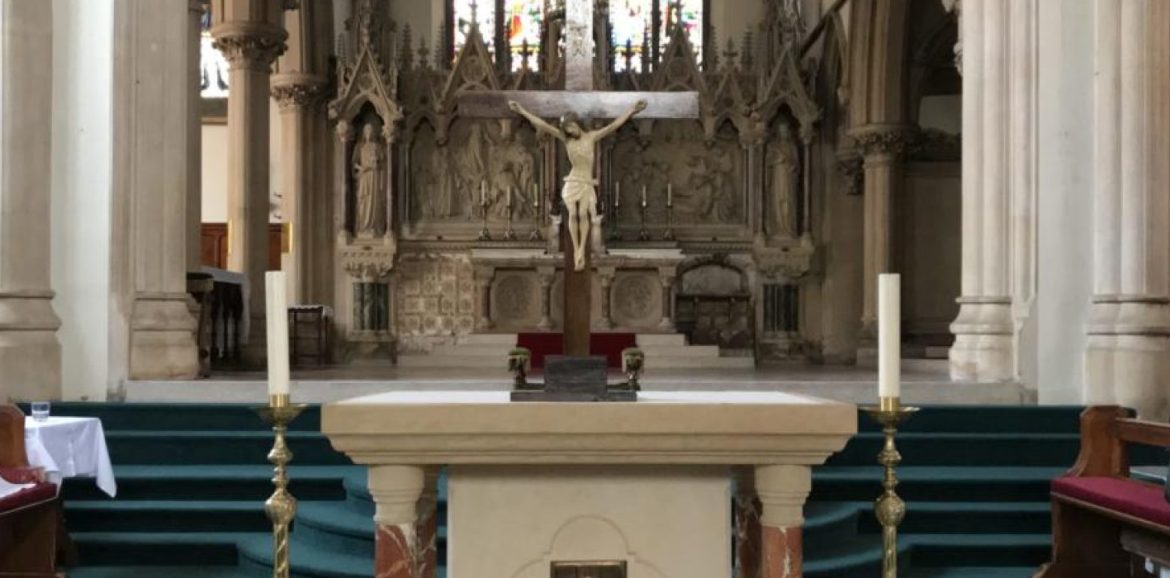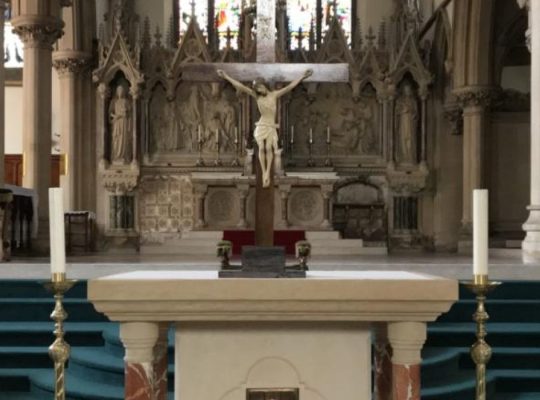Welcome to the wonderful feast of the Holy Trinity, and probably the greatest mystery of our faith. Although it is impossible to fathom completely, the mysteries of our faith [that is why they are called mysteries]; this does not mean that we cannot know something about this, the greatest of mysteries, for a great deal has been revealed through Holy Scripture about the Blessed Trinity; for God wants us to know that he is a Trinity of Persons.
That he is God— and that in his one Divine Nature, there are three Divine Persons ‘Father, Son, and Holy Spirit.’ Each totally possessed, one by the other—each totally distinct from one another—and totally in love.
Saint John Henry Newman describes the Blessed Trinity thus: ‘But do not think that God was idle in that eternity [before the creation of the world] for he was not [let’s not forget that God is outside time and space] He was infinite in his love and activity. For endless ages, God rejoiced in the knowledge of himself; and knowing himself—he declared and expressed his knowledge in the infinite Word—his only begotten Son, the second person of the Blessed Trinity—to whom he communicates his nature, his life, his perfections. These two persons loved one another with an infinite love [for God is infinite love] and from their mutual embrace, bursts forth the Holy Spirit of love—the third person of the Blessed Trinity.’
For many Christians, the Holy Trinity evokes a particular lofty and impenetrable mystery of faith, a most abstract dogma, completely apart from daily life, one among those dogmas that least count in their psychology and preoccupation of everyday life. But how wrong we can be? When we examine the mystery of the Holy Trinity, we could say that the Person most familiar to us is the Second Person of the Trinity; God the Son. We have read much about his ministry in the Gospels. I suppose then the next Person we are familiar with, is God the Father himself, revealed throughout Scripture, and particularly by the Son. Among the three Persons of the Trinity, the Holy Spirit is the most mysterious, almost by definition. He does not have a face; he does not use words but an ineffable language. He acts in secret in the depths of the human heart and in the most hidden centre of the realities of the world. But paradoxically, the Holy Spirit is the one Person of the Holy Trinity with whom we are — whether or not we attend to the fact — most frequently and most concretely in contact, and this in spite of his elusive nature that defies all representation. Indeed, nothing happens in the world, in the Church, in the liturgy, for the good and salvation of every believer, without the Spirit’s acting in a necessary, direct and decisive way. We are often able to detect his invisible presence and action, sometimes even clearly, in the most ordinary circumstances of daily life. But even though they may be striking, the gifts and fruits of the Spirit can be discovered only in faith. This is even more true, when we speak of the radical transformation that his action produces in believers, which is the first and most fundamental of his missions in their regard.
In the same way that God has revealed himself many times by acting in the world, the Holy Spirit has manifested himself by what he worked in Jesus, beginning with the solemn investiture of the Son of God at his baptism on the banks of the River Jordan. He was with him throughout his ministry. However, it is at the time of Easter that the role of the Holy Spirit appears in full light to believers. For God ‘raised the Lord’ by the Spirits power (Rom 8:11) He wishes to share this gift with each and every one of us, to be resurrected with Christ. Through our baptism, ‘the bath of rebirth // and renewal by the Holy Spirit.’ (Titus 3:5) we ‘were indeed buried with him through baptism into death, so that, just as Christ was raised from the dead by the glory of the Father, we too may live in newness of life.’ (Rom 6:4) and share in his divinityThe Spirit has made us God’s children, through baptism, and as his children; He leads us. He teaches us. He holds us in being. And at our leaving this life will be our Advocate in order to share in the promises of Christ.
The certitude of really being children of God is based on the witness that the Spirit bears ‘with our spirit.’ In other words, it is a certitude of faith. This is shown in the way we address God in prayer inspired by the Spirit. We say ‘Abba,’ a term that expresses love, respect and familiarity. ‘Abba’, this is what Jesus called his Father (and ours) in Gethsemane.
The fact that we are adopted children of God makes us ‘heirs of God and joint heirs with Christ,’ called to share eternal life with him in glory to which he has been raised after his Pasch. Having become children of God by grace, called to be glorified with Christ, we, the Lord’s disciples are, by the very fact of their election, involved in the completion of the ongoing work of Christ in the world. Such is our responsibility.
Remember what the Lord said to us in the Gospel at Pentecost: ‘When the Advocate comes, whom I shall send you from the Father. The Spirit of Truth who issues from the Father, he will be my witness. And you too will be witnesses……. I still have many things to say to you but they would be too much for you now. But when the Spirit of Truth comes he will lead you to the complete truth, since he will not be speaking as from himself, but will say only what he has learnt, and he will tell you of the things to come. He will glorify me, since all he tells you will be taken from what is mine. Everything the Father has is mine; that is why I said all he tells you will be taken from what is mine.’ A certain revelation that the Holy Spirit proceeds from the Father and the Son and is in this world today. For Christ promised to be with us always as we continue his mission, and he is with us in many ways, but not least in the Holy Spirit. ‘Go therefore, make disciples of all the nations; baptise them in the name of the Father, and of the Son, and of the Holy Spirit, and teach them to observe all the commands I gave you. And know that I am with you always; yes, to the end of time.’
A definite and concrete revelation that God is Trinity, Father, Son, and Holy Spirit one God but three Divine persons. Equal in divinity and inseparable, yet distinct, one from another. Everything coming from the Father and returning to him through the Son, in the Holy Spirit. ‘There is a holy and perfect Trinity, acknowledged as God in the Father and the Son and the Holy Spirit….. The Father does all things through the Word in the Holy Spirit. Thus the unity of the Holy Trinity is safeguarded, and, in the Church, one God, who is above all and through all and in all is announced; above all as Father, principle and source, through all, through the Word, and in all, in the Holy Spirit.’
The profession of Trinitarian faith, explicitly formulated for the first time in Matthew’s Gospel rapidly imposed itself in the Church for the administration of baptism. What can appear today as a rather obscure expression must, on the contrary, be understood in a very concrete sense: ‘the life and work of Jesus are the life and work of the Father in the Spirit’ and we have share in it. The ancient baptismal rite was very expressive from this point of view. Three questions were asked of those to be baptised, the same is asked of us today: ‘Do you believe in God the Father?’ ‘Do you believe in Jesus Christ his Son?’ ‘Do you believe in the Holy Spirit?’ And at each response, the catechumens were plunged into the baptismal water, thus dying to sin and being reborn to eternal life. The apostles are sent to give the ‘baptism of rebirth ‘ to those who welcome the good news and are converted to the Lord. Teach ‘them to observe all that I have commanded you.’ The converts must not be left to themselves after their baptism. They have to be helped to progress in faith throughout their lives. This aspect of the mission constitutes a strict duty for missionaries of the Gospel and a right for new Christians. Baptised persons must learn to live as Christians, behave as children of the heavenly Father, and allow themselves to be led by the Spirit.
Until the end of the age, the Church, coming forth from the eternal Father’s love, founded in time by Christ the Redeemer, and made one in the Holy Spirit, is the image of the Holy Trinity and the place where the three Person’s work as one for the salvation of the whole world.
‘Glory be to the Father, and to the Son, and to the Holy Spirit, as it was in the beginning, is now, and ever shall be. Amen.’
HAPPY FEAST


